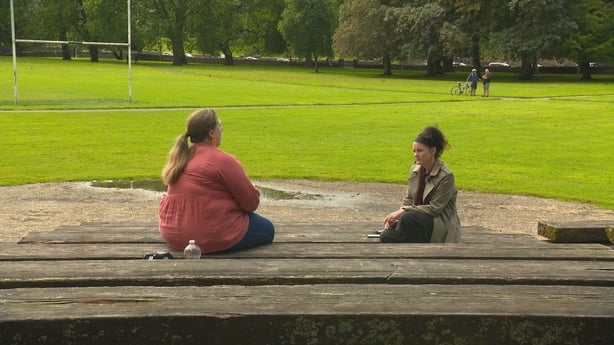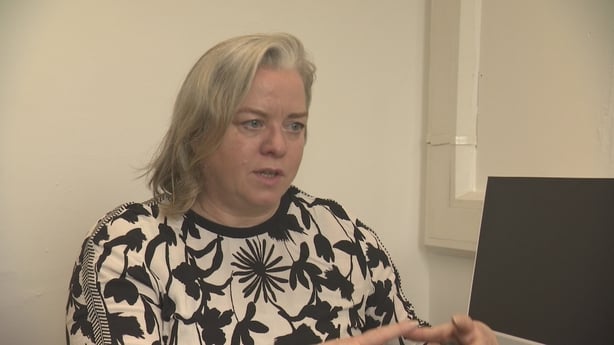Rape Crisis Ireland (RCI) has called on the incoming government to establish a Justice Commission to reassess how survivors of sexual violence are treated in Ireland.
Five years ago, the O'Malley Review recommended a more victim-centred criminal justice system.
This resulted in the introduction of legislative and practical reforms by the Department of Justice called Supporting a Victim’s Journey.
However, RCI has said the "adversarial system" inflicted on survivors of sexual assault is not fit for purpose.
Our Social Affairs Correspondent Ailbhe Conneely has been examining some of the changes introduced in the last five years and the difficulties that remain.
Miriam Henry feels let down by the justice system.
Last summer, her brother - Gerald Henry of Kiltomey, Lixnaw in Tralee, Co Kerry - was found guilty of habitually sexually abusing Miriam and her sister.
The court heard that the abuse started when Miriam was six and her brother was 12 - it continued for four years.
Gerald Henry was given a sentence of 18 months, which was suspended for three years.
Miriam Henry first went to gardaí about the abuse she experienced as a child in 2018, but it took six years for the case to get to trial due to the Covid-19 pandemic and other delays.
When it finally went ahead, their experience of the courts and lack of support they received throughout the process was retraumatising, according to Miriam Henry.
"Victims are known as witnesses rather than victims. We're witnesses under the same title as anyone else would be coming to court to give evidence.
"There's no one supporting you all the way through, the only support that we got during the court case was from the Kerry Rape and Sexual Abuse Centre.

"In the evenings after the day at court, you're just left...drive back to Killarney there, it doesn't matter what state you are in, it doesn't matter what you've done during the day. The day I gave my evidence, that took two and a bit hours...oh yeah, just go home now. Like, there's no support for you."
An Garda Síochána is one of several State agencies that liaise with victims throughout the investigative and judicial process.
While it would not comment on "named individuals", the Garda Press Office said information, support and protection is provided through investigating garda members, Garda Victim Service Offices and Family Liaison Officers.
There are currently 27 operational Divisional Protective Service units.
"Garda Victim Services Offices were established in each garda division to ensure victims of crime are kept informed about the progress of their case and the supports available to them," it said.
However, according to Miriam Henry, she and her sister were never put in touch with a liaison officer in the lead up to or during the trial.
We don't feature anywhere in the scales of justice
An Garda Síochána pointed out that supporting all victims of crime is now part of every anti-crime strategy and Victim Service Offices are the central point of contact for victims of crime and trauma in each division.
Such was her level of frustration and worry for other victims and survivors of sexual abuse, Miriam Henry wrote to the Taoiseach and the Minister for Justice to explain the reality of the system.
"We don't feature anywhere in the scales of justice. Like we're an afterthought and that needs to change. It needs to change so that more victims and survivors feel safe to come forward."
Following the publication of the O'Malley report in 2020 - which recommended a more victim-centred criminal justice system - the Department of Justice introduced "legislative and practical reforms".
They included legislating for preliminary trial hearings to increase efficiency in how trials are run, undertaking a mapping exercise to identify gaps in services and supports provided for victims with increased funding to address them, and an improved Victims Charter website providing a comprehensive repository of information for victims which has a dedicated section providing specialist information for victims of sexual offences.
However, few of these reforms were evident to Miriam Henry as she and her sister navigated the system in a rural courthouse.
We need your consent to load this rte-player contentWe use rte-player to manage extra content that can set cookies on your device and collect data about your activity. Please review their details and accept them to load the content.Manage Preferences
In fact, since the conclusion of the case last summer, other victims and survivors have contacted Ms Henry explaining their reticence to come forward.
"I've had so many people contact me on my social media, saying 'I'm so glad I never went to the guards, so glad I never went through the court process. I was abused as a child, I was sexually assaulted as a teenager', and that's a terrible thing, and that should be something everybody should be worried about," she said.
Rape Crisis Ireland has described Ireland's low reporting and prosecution rates, coupled with the injustices of the system itself, as "a level of failure which arguably puts this criminality, in the main, beyond the reach of justice".
It has called on the incoming government to establish a Justice Commission to explore and assess the positioning of survivors within criminal justice on a human rights basis, but also examine the balance the rights of the survivor and the accused.

Executive Director Dr Clíona Saidléar has said while a lot of work has been done legislatively to organise the courts properly, more work needs to be done on the ground to stop failing survivors.
"RCI believe it is time to ask whether we need a new system, a new approach, a legal and cultural shift that speaks clearly and unequivocally to who we are and how we treat those made vulnerable by these crimes," she said.
A spokesperson for the Courts Service acknowledged that making criminal allegations was very challenging for victims, "as is facing into a process where a victim’s evidence is questioned and their credibility questioned".
He said facilities such as victim support rooms/suites were provided in most county town courthouses across the country and that pre-trial visits to courts are often arranged to familiarise witnesses/victims with the courts, provide online information, virtual tours/3D tours of court facilities, and reserved seating.
Video-link booths are also provided should a witness need to appear remotely.
He said the courts service was becoming "a trauma informed organisation" and staff are being trained.
"All we can do as a Courts Service is to continue to work to improve our facilities, build partnerships with NGOs and An Garda Síochána in the provision of services to victims, so that some of the challenge for victims is reduced."






